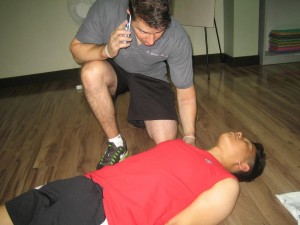Overview of Back Pain
Back pain is not at all uncommon. Many of us suffer from back pain on occasion while in other cases our back pain becomes a chronic issue, affecting and upsetting our daily routine, our very lives.

While back pain is normally not attributed to a serious disease, and in most cases is not chronic, it can be very intrusive when it does intrude upon our daily activity. Fortunately, there are things we can do to help avoid this. Often, a change in lifestyle and our work habits can be a wonderful aid in eliminating the discomfort of an aching back.
Back Pain Management
1. Regular exercise can be very helpful to ensure muscle support for our entire body as well as improving our posture. If at all possible, about thirty minutes of daily moderate physical exercise can be very helpful. If you can’t do thirty minutes during one session, this could be broken up into shorter segments, perhaps scheduled throughout the day.
2. If we work in an environment where there is considerable carrying of objects, in the workplace or at home, it is extremely important that we never simply bend over to pick up a load. We should squad down, grasp the box, or basket, etc. firmly and, holding it as close to our bodies as possible, use our legs to straighten and lift the object, therefore putting the strain on our leg muscles rather than on our back.
Also, whenever possible, we should never hesitate to ask for help where there is another person. When possible carts or dollies may be very helpful in avoiding extra strain on our backs.
3. Weight. Being overweight already puts extra strain on our back, so if at all possible, maintaining a healthy body weight in proportion to our size, can be very helpful in avoiding the pain of an aching back.
4. Often, while working, we become so engrossed in our activity that we forget for the moment about our posture. We should keep this in mind at all times, not only while working on our feet but also when we’re sitting down, such as during driving a vehicle or sitting at a desk for long periods without a break.
We need to make every attempt to train ourselves to sit straight, and whenever possible use back support. Sometimes a small pillow to support our back and/or a footstool can be very helpful.
5. We need to take regular breaks, albeit short breaks. We don’t only have to take a fifteen minute every two hours or so, but brief breaks, such as a walk to the water cooler, or just taking a moment to stand erect and stretch and perhaps shrug our shoulders, little brief exercises such as that can be very beneficial.
6. Learning to relax. This can be very difficult for those of us who, by our very nature are activity-minded and have difficulty simply “slowing-down”. There are techniques to help us learn to relax and it is important to become aware of these and perhaps we can take something positive from these techniques.
7. In the home, our mattresses can be a friend or a foe. Many of us have mattresses that have long outlived their useful lives. They may look all right to the eye, but the inner springs have weakened and the padding that covers them has worn and compacted in such a way that they no longer give us the firm and straight back support they did when new.
If our mattresses are more than five years old, it may be time to consider the purchase of a new one. Newer mattresses in general are technically better than they used to be and your back will certainly thank you.
Getting Help for Back Pain
Most physicians agree that one of the best and more important aspects of the treatment of an aching back is to remain active and continue normal activities, be they sport and play or work, as long as possible. Back injuries, by and large tend to improve by themselves as long as the problems is not constantly aggravated.
When back pain becomes a constant worry, it is important of course to see your doctor in the hope of learning there not medical problems of which you’re not aware.
If you do suffer chronic back pain and have any of the following signs, then it is advised to seek immediately consultation with a medical professional:
1. Pain that is severe and doesn’t get better.
2. Your back pain actually makes you feel sick and/or you have a fever.
3. If you should have difficult controlling or passing urine.
4. If you should become aware of any numbness around your genitals or your anus.
5. Any pain, numbness or unusual weakness in your legs.
6. You begin to feel unsteady on your feet.
The important thing for us to remember is that back pain is common. We’re not alone. And Back pain generally comes from our ligaments and our muscles. There can be many causes of back pain such as inflammation, tension, injury, or even a muscle imbalance.
If we expect our backs to take care of us, we have to take care of our back!
